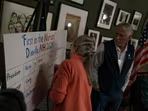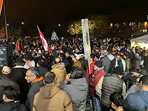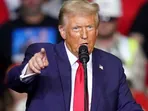China’s stance on Hamas key point of division: US Envoy
The US’s top diplomat in China called on President Xi Jinping’s government to denounce terrorism by Hamas, citing Beijing’s stance toward the group as yet another challenge in fraught ties between the world’s biggest economies.

In an interview with Bloomberg Television on Thursday, Ambassador Nicholas Burns said the US and China had differing views on the Israel-Hamas war. President Joe Biden affirmed the US’s strong support for Israel during a visit to the country this week, while China has aligned with the Palestinian cause and avoided condemning Hamas, which the US considers a terrorist organization.
We're now on WhatsApp. Click to join.“We do not have identical views on this particular position,” Burns said when asked whether he saw the Middle East tensions as an opportunity to improve relations between the US and China. Hamas’s support for the destruction of Israel ran counter to China’s vision for a lasting resolution, he added.
Follow Israel-Hamas war LIVE updates here.
“China has taken the position of supporting the two state solution — as has the United States — and so obviously, the focus here should be directed against Hamas,” Burns said.
When asked about the ambassador’s remarks Friday at a regular press briefing in Beijing, Foreign Ministry spokeswoman Mao Ning said “major countries, when dealing with hotspot issues in the region, should be objective and just.”
With Israel's air strikes bombarding Gaza following Hamas’s deadly incursion into the country earlier in the month, leaders around the region and across the world are seeking to prevent the conflict from spreading. The US in particular has urged China to use its influence with Iran to prevent a wider escalation.
Tensions ratcheted up further after a blast at a hospital Tuesday in Gaza that Palestinian officials said killed hundreds. Israel and Hamas have issued rival claims about who was responsible.
US congressional leaders confronted Xi earlier this month over his country’s failure to condemn Hamas and show support for those killed in Israel. Senate Majority Leader Chuck Schumer asked China to stand with Israel and condemn the attacks, hours after he blasted Foreign Minister Wang Yi for showing “no sympathy or support for Israel during these tough, troubled times.”
China later said it condemns actions that harm civilians and that it’s willing to work with the international community toward peace talks. On Thursday, Xi called for an immediate ceasefire while offering to coordinate with Egypt and other Arab nations “to push for a comprehensive, just and lasting solution to the Palestinian issue as soon as possible.”
Read Here | 'They came to murder': Israeli community shattered by Hamas attack
Xi earlier this year sought to play global peacemaker, proposing a ceasefire in Ukraine and helping long-time rivals Saudi Arabia and Iran reach a diplomatic truce. He later proposed an Israel-Palestine peace conference.
China’s initial response to the Israel-Hamas war was similar to its reaction to Vladimir Putin’s invasion of Ukraine: It has avoided naming an aggressor and failed to offer any specific offer of immediate assistance. Wang last week said that China is pushing for “a more authoritative, influential and broad-based international peace conference” hosted by the United Nations to find a lasting solution to the issue.
No Concessions
More broadly, China and the US have sought to stabilize relations that deteriorated in recent years over issues ranging from the self-ruled island of Taiwan to espionage concerns. Biden has dispatched a flurry of cabinet-level officials to Beijing since June to smooth ties, ahead of an expected meeting with Xi next month in San Francisco. The US has accepted China’s invitation to attend a top security forum in Beijing this month.
Burns said efforts over the past several months to create cabinet-level contact between the two have yielded results. “Where we didn’t have that sustained high-level contact, we now have it,” he said.
The ambassador said Chinese ministers will be traveling to Washington in the coming months. “We need this kind of interaction, but the US is not going to fundamentally make concessions just to have meetings,” he said.
Military Advantage
Even as there are signs that ties are starting to normalize, the countries continue to compete on major issues including security, technology and human rights, according to Burns. He said a recent tightening of export controls on high-tech products were needed to close loopholes.
“We are serious about preventing any kind of military advantage to the People’s Liberation Army here because of the export of advanced dual-use American technology,” Burns said.
He repeated calls for a reopening of military-to-military communication channels that were shut down after former US Speaker Nancy Pelosi’s visit to Taiwan. “The last thing that we should want in this relationship is the absence of communication,” Burns said.
Disclaimer: The copyright of this article belongs to the original author. Reposting this article is solely for the purpose of information dissemination and does not constitute any investment advice. If there is any infringement, please contact us immediately. We will make corrections or deletions as necessary. Thank you.
Title:China’s stance on Hamas key point of division: US Envoy
Url:https://www.investsfocus.com









